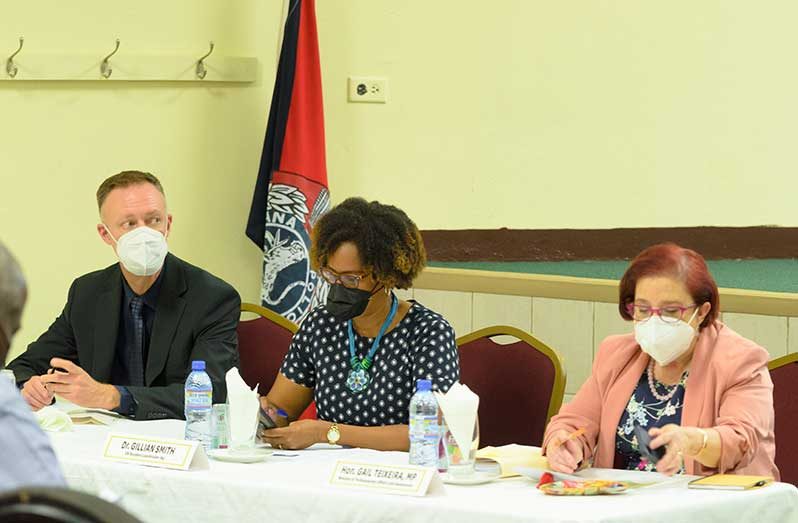THE Government of Guyana in collaboration with the United Nations Office on Drugs and Crime (UNODC) is facilitating a three-day workshop aimed at strengthening local capacity among various authorities to guard against corruption.
The multi-agency workshop being held at the Guyana Police Force Training Centre, Camp and Young Streets, Georgetown, was officiated by Minister of Parliamentary Affairs and Governance, Gail Teixeira.
Minister Teixeira said that part of her ministry’s mandate is to address treaty obligations and treaty reporting in relation to international treaties such as the United Nations Convention Against Corruption (UNCAC) and the Inter-America Convention Against Corruption (IACAC).
It is for this reason that the workshop is tailored to build local capacity to uphold the treaties and fulfill those obligations.
She said that for many years, Guyana has hired consultants to undertake the obligations in relation to treaty reporting, whereby, independent agencies are contracted to do the work and provide the status report. This, however, in her view, cannot work.
“[This] cannot work… as we need to build institutional capacity in our country so that this becomes part of the fabric of what we do,” Minister Teixeira related.
“If we’re serious about anti-corruption, if we’re serious about ensuring that tax payers’ money is used for the good of the people and not being used for abuse, corruption, embezzlement, etcetera, then we have to ensure that the agencies involved are prepared and willing to take on the job,” she said.
The minister said that preparation of treaty reports requires the participation of all parties in the country, especially the agencies involved and even members of civil society, who understand their role fully.
Not only is capacity building imperative for reporting, it is also important for activities subsequent to the submission of the report such as the implementation of recommendations.
“One of the challenges we face as a country generally is data collection and being able to develop and design data programmes that would capture the information that we require instead of waiting a few months before data is required to scramble data,” Minister Teixeira said.
Data is necessary for reporting on convention obligations, and it is also required to be collected for the measurement of sustainable development goals.
Considering the benefits of data, Minister Teixeira believes that it is necessary to modernise government services to meet the existing demands.
And while in reporting on the mechanism for the review of implementation of the United Nations Convention against Corruption, Teixeira said Guyana has a good legislative framework, in terms of offices such as the Auditor General, the Ombudsman, the Director of Public Prosecutions and constitutional commissions.
LIMITATIONS
There are, however, limitations to their functions, but there is room for improvement and advancement.
“So, we have been innovative, we have been able to share and devolve a level of governance that includes the Parliament, includes the civil society involvement and the opposition; however, once we set those bodies up, we have to be able to ensure they have resources and that the proper training is going on to make sure they can function with their mandate,” Minister Teixeira said.
She added: “We need as a country, in terms of our skills base, to be able to work in an organised, structured manner and to be able to develop the capacities of each of the agencies involved as well as at the national level and that is what this workshop is about.”
The government has also recognised that the private sector is especially obligated to oblige with the treaties and that is why the national co-coordinating committee for the implementation of the UNCAC and the IACAC, which consists of 12 agencies and is rapidly being expanded, was constituted.
In addition, the multi-agency training will develop not only governmental agencies and constitutional commissions, but every sector that is involved in the training.
Minister Teixeira said that capacity building in government agencies is imperative to tackle these issues and the training is imperative in these regards.
“The adhocism that existed for many years, we have to put that aside and start the ground work of building our own capacity,” Teixeira said.
Present at the opening ceremony on Monday were UNODC Crime Prevention and Criminal Justice Officer, Jason Reichelt; Caribbean Community (CARICOM) Secretary-General, Carla Barnett and UN Resident Coordinator (ag), Dr. Gillian Smith.




.png)









